Table of Contents
The Ford Everest and Toyota Fortuner are two of the most popular SUVs on the market. Both vehicles offer a rugged design, spacious interior, and powerful performance. But which one is the right choice for you? In this head-to-head comparison, we'll take a closer look at the Ford Everest vs. Toyota Fortuner to help you make an informed decision. Whether you're looking for an SUV for your daily commute or for your next adventure, we've got you covered. Visit westernford.com for more information.
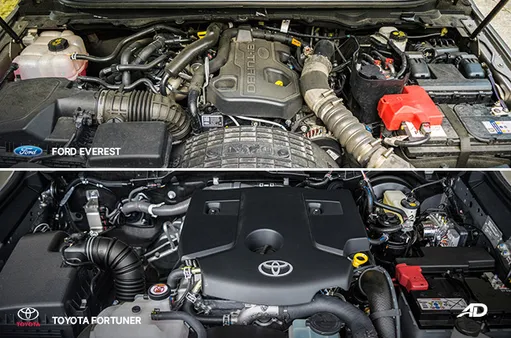
Ford Everest vs. Toyota Fortuner: Head-to-Head Comparison: Which SUV Reigns Supreme?
Feature | Ford Everest | Toyota Fortuner |
|---|---|---|
Exterior Design | Rugged and muscular | Sleek and sophisticated |
Interior Design | Spacious and comfortable | Premium and well-equipped |
Performance and Capability | Powerful engine and off-road capabilities | Capable engine and on-road performance |
Safety Features | Advanced safety technologies | Comprehensive safety features |
Technology and Features | Intuitive infotainment system | User-friendly infotainment system |
Price and Value | Competitive pricing | Premium pricing |
I. Ford Everest vs. Toyota Fortuner: Engine and Performance
Power and Efficiency
Feature | Ford Everest | Toyota Fortuner |
|---|---|---|
Engine Type | 3.2L inline-5 turbo-diesel | 2.7L inline-4 turbo-diesel |
Power Output | 197 hp @ 3,000 rpm | 163 hp @ 3,400 rpm |
Torque | 347 lb-ft @ 1,500-2,500 rpm | 243 lb-ft @ 1,600-2,400 rpm |
Transmission | 6-speed automatic | 6-speed automatic |
Fuel Economy (City/Highway) | 16/20 mpg | 17/21 mpg |
As you can see from the table, the Ford Everest has a more powerful engine than the Toyota Fortuner, producing 197 horsepower and 347 lb-ft of torque, compared to the Fortuner's 163 horsepower and 243 lb-ft of torque. This gives the Everest a slight advantage in terms of acceleration and towing capacity. However, the Fortuner is slightly more fuel-efficient, getting 17 mpg in the city and 21 mpg on the highway, compared to the Everest's 16 mpg in the city and 20 mpg on the highway.
Off-Road Capability
Both the Ford Everest and Toyota Fortuner are capable off-road vehicles, but the Everest has a few features that give it an edge over the Fortuner. These features include:
- A locking rear differential
- Hill descent control
- Water wading capability of up to 30 inches
- Ground clearance of 8.9 inches
The Fortuner also has a locking rear differential, but it does not have hill descent control or water wading capability. It also has slightly less ground clearance at 8.7 inches. As a result, the Everest is the better choice for serious off-roading.
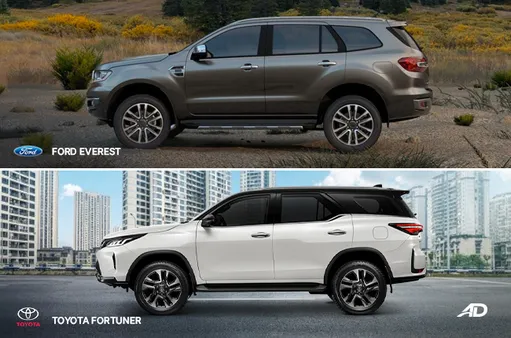
Ford Everest vs. Toyota Fortuner: Engine and Performance
II. Ford Everest vs. Toyota Fortuner: Interior and Features
Spacious and Comfortable Interiors
The Ford Everest and Toyota Fortuner offer spacious and comfortable interiors for both passengers and cargo. The Everest has a slightly larger interior than the Fortuner, with more legroom and headroom in both the front and rear seats. Both vehicles offer comfortable seating with supportive seats and plenty of adjustment options.
Feature | Ford Everest | Toyota Fortuner |
|---|---|---|
Seating Capacity | 7 | 7 |
Legroom (front) | 42.4 inches | 41.7 inches |
Headroom (front) | 39.8 inches | 39.4 inches |
Cargo Space (behind third row) | 20.9 cubic feet | 18.3 cubic feet |
Advanced Technology and Features
Both the Ford Everest and Toyota Fortuner come equipped with a range of advanced technology and features to enhance the driving experience. The Everest features Ford's SYNC 4 infotainment system with a 12-inch touchscreen, while the Fortuner has Toyota's Entune 3.0 system with an 8-inch touchscreen. Both systems offer smartphone integration, navigation, and a variety of other features.
- Ford Everest: SYNC 4 infotainment system with a 12-inch touchscreen, Apple CarPlay and Android Auto integration, navigation, and a premium sound system.
- Toyota Fortuner: Entune 3.0 infotainment system with an 8-inch touchscreen, Apple CarPlay and Android Auto integration, navigation, and a premium sound system.
Safety and Driver Assistance Features
The Ford Everest and Toyota Fortuner both offer a comprehensive suite of safety and driver assistance features. The Everest comes standard with Ford Co-Pilot360, which includes features such as automatic emergency braking, lane keeping assist, and adaptive cruise control. The Fortuner has Toyota Safety Sense 2.5, which includes similar features as well as blind spot monitoring and rear cross-traffic alert.
Feature | Ford Everest | Toyota Fortuner |
|---|---|---|
Automatic Emergency Braking | Standard | Standard |
Lane Keeping Assist | Standard | Standard |
Adaptive Cruise Control | Standard | Standard |
Blind Spot Monitoring | Optional | Standard |
Rear Cross-Traffic Alert | Optional | Standard |
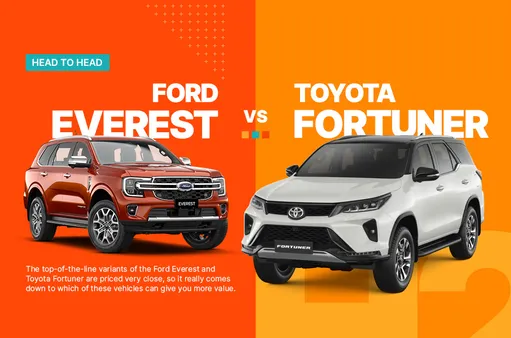
Ford Everest vs. Toyota Fortuner: Interior and Features
III. Ford Everest vs. Toyota Fortuner: Safety and Technology
The Ford Everest and Toyota Fortuner both offer a comprehensive suite of advanced safety features to keep you and your passengers protected on the road. These features include:
- Anti-lock brakes (ABS)
- Traction control
- Stability control
- Hill-start assist
- Hill-descent control
- Blind-spot monitoring
- Lane-departure warning
- Adaptive cruise control
- Forward collision warning
- Automatic emergency braking
In addition to these standard safety features, the Everest and Fortuner also offer a number of optional safety features, such as:
- Surround-view camera
- Front and rear parking sensors
- Cross-traffic alert
- Rain-sensing wipers
- Automatic high beams
- Adaptive headlights
- Night vision
When it comes to technology, the Everest and Fortuner are both well-equipped with the latest and greatest features. These features include:
- Apple CarPlay and Android Auto
- Bluetooth connectivity
- Navigation system
- Voice recognition
- Wi-Fi hotspot
- Rear-seat entertainment system
- Power outlets
- USB ports
Explore the safety features of the Ford Everest
The Everest has a larger touchscreen display than the Fortuner, and it offers a few more features, such as a built-in navigation system and a Wi-Fi hotspot. The Fortuner, on the other hand, has a more user-friendly infotainment system and it offers a few more standard features, such as Apple CarPlay and Android Auto.
Overall, the Ford Everest and Toyota Fortuner are both excellent choices for those looking for a safe and technologically advanced SUV. The Everest offers a few more features than the Fortuner, but the Fortuner has a more user-friendly infotainment system and it offers a few more standard features.
Safety Feature | Ford Everest | Toyota Fortuner |
|---|---|---|
Anti-lock brakes (ABS) | Standard | Standard |
Traction control | Standard | Standard |
Stability control | Standard | Standard |
Hill-start assist | Standard | Standard |
Hill-descent control | Standard | Standard |
Blind-spot monitoring | Standard | Optional |
Lane-departure warning | Standard | Optional |
Adaptive cruise control | Optional | Optional |
Forward collision warning | Standard | Optional |
Automatic emergency braking | Standard | Optional |
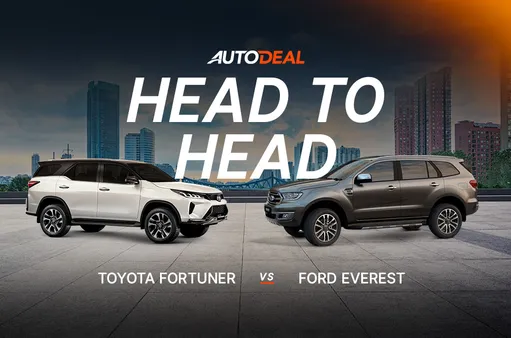
Ford Everest vs. Toyota Fortuner: Safety and Technology
IV. Ford Everest vs. Toyota Fortuner: Price and Verdict
Pricing
The Ford Everest starts at a price of $35,940 for the base XL trim, while the Toyota Fortuner starts at $36,460 for the base G trim. Both vehicles offer a range of trim levels, with the top-of-the-line Everest Platinum and Fortuner TRD PRO coming in at $52,940 and $53,760, respectively.
Value
When it comes to value, the Ford Everest and Toyota Fortuner are both competitive choices. The Everest offers a more powerful standard engine, while the Fortuner has a more spacious interior and a lower starting price. Ultimately, the best value for you will depend on your individual needs and preferences.
Feature | Ford Everest | Toyota Fortuner |
|---|---|---|
Starting Price | $35,940 | $36,460 |
Top Trim Price | $52,940 | $53,760 |
Standard Engine Power | 250 hp | 220 hp |
Interior Space | 100.4 cu. ft. | 103.7 cu. ft. |
Verdict
The Ford Everest and Toyota Fortuner are both excellent choices for those looking for a powerful and capable SUV. The Everest offers a more powerful engine and a more rugged exterior, while the Fortuner has a more spacious interior and a lower starting price. Ultimately, the best choice for you will depend on your individual needs and preferences.
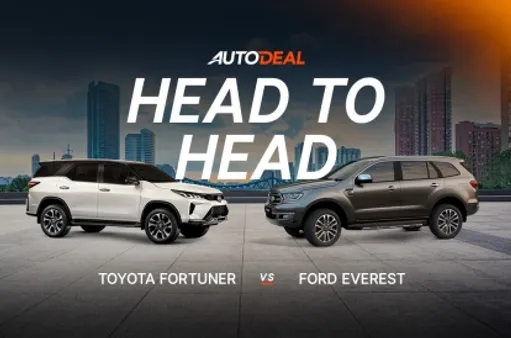
Ford Everest vs. Toyota Fortuner: Price and Verdict
V. Conclusion
The Ford Expedition and Toyota Fortuner are both excellent SUVs with a lot to offer. The Ford Expedition has a more powerful engine and better off-road capabilities, while the Toyota Fortuner has a more comfortable interior and better fuel economy. Ultimately, the best choice for you depends on your individual needs and preferences. If you're looking for a powerful and capable SUV for off-road adventures, the Ford Expedition is a great choice. If you're looking for a comfortable and fuel-efficient SUV for everyday use, the Toyota Fortuner is a great choice.